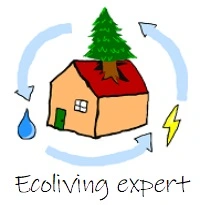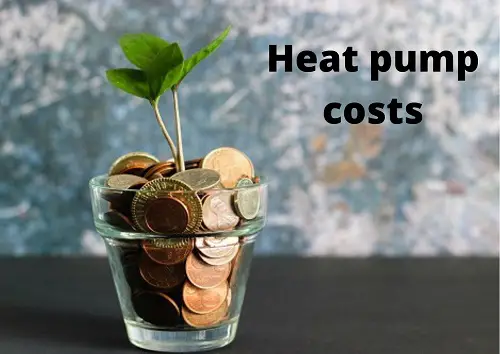A heat pump costs on average $8.000, and its running costs are $850 per year. It will save $405 per year on average and has a return on investment of 20 years. The exact costs depend on the size and type of the heat pump, the price of electricity, and your energy use. Also, the temperature difference between the required heat and the heat source influences the efficiency and therefore the running costs of the heat pump.
There are four different heat pump types. Each one has its own costs, efficiency, and return on investment. The four types are:
- Air-source: takes energy from the air
- Ground-source: takes energy either from the ground or from groundwater
- Exhaust: takes energy from heat loss such as a gas furnace exhaust
- Hybrid: a combination of a heat pump and another heating system such as a gas boiler
Overview table of heat pump costs
The following table gives an idea of the costs, efficiency, and return on investment (ROI) you can expect for the different types of heat pumps. However, the actual costs and efficiency are highly dependent on your specific situation. Therefore, the information in the table can only be used to give you a general idea of what to expect.
The information in the table is based on the assumption that your home is moderately insulated and has multiple external walls (meaning you are not insulated on every side by surrounding houses or apartments). It also assumes a household of three people.
If your insulation is better than the assumption, you can expect lower running costs and a shorter ROI. If you have very poor insulation, you will lose more heat. Therefore, your monthly costs and ROI will be higher.

The following table is based on information provided by the Dutch website Milieucentraal.nl. Milieucentraal is an initiative by the Dutch government to provide accurate information about, among others, how to improve the sustainability of our home. The numbers and costs in this table are therefore based on data from the Netherlands. The following is assumed:
- Electricity price: € 0,22/kWh
- Gas price: € 0,79/m³
- Gas use per year: 1.000 m³
| Type of heat pump (source) | Range of purchase cost (incl. installation) | Energy use per year | Heat output | Efficiency range (depends on source temperature) | Running costs per year | Average savings per year (compared to gas) | Return on investment |
|---|---|---|---|---|---|---|---|
| Air | $7.400 to 16.000 (€6.500 to 14.000) | 2.800 kWh | 3 – 12 kW | 100 – 400 % | $700 (€610) | $500* (€440) | 15 – 32 years |
| Ground (or groundwater) | $9.700 to 22.000 (€8.500 to 19.500) | 2.100 kWh | 4 – 16 kW | 200 – 400 % | $525 (€460) | $675* (€590) | 14,5 – 33 years |
| Exhaust | $3.400 to 5.400 (€3.300 to 4.700) | 800 m³ gas + 1.600 kWh | 5 kW | 100+% | $1.100 (€970) | $215 (€190) | 17 – 25 years |
| Hybrid | $4.900 to 7.300 (€4.300 to 6.400) | 750 m³ gas + 1.600 kWh | 5 kW | 100+% | $1.100 (€960) | $230 (€200) | 21,5 – 32 years |
Table explanation
* The savings of both an air-source and ground-source heat pump include their direct cost savings due to low energy use as well as not having to pay for a gas connection anymore. This of course assumes that you are switching from gas-based cooking to electrical cooking.
Technically, this would increase costs slightly because cooking will become a bit more expensive. Using gas for coocking is cheaper than using electricity. However, this is a negligible amount compared to heating costs.
Why ground-source pumps are more expensive
The price of a heat pump depends on its size (a larger heat pump can create more heat), as well as the type. The different types each have very different costs for installation. For example, a ground-source heat pump is more expensive to install because a hole needs to be drilled into the ground.
A ground-source heat pump has several varieties that each have different costs associated with installation. For example, a deep-dwelling ground source heat pump is more expensive than a surface-based one. Deep-dwelling heat pumps are more expensive because pipes need to be drilled up to 400 feet deep (source).
Deep-dwelling heat pumps reach deep down to extract or deposit heat in the ground or the groundwater. Surface-based heat pumps require a network of tubes just below the surface or on the bottom of a pond.
Keep in mind that you need a permit for a ground/groundwater heat pump.
Why a ground-source pump has the lowest running cost
A ground-source heat pump has the lowest running cost because it is the most efficient. It is more efficient than an air-source heat pump since the ground or groundwater has a more stable temperature.
The ground as well as the groundwater does not reach freezing temperatures even when the air does. Therefore, during the cold months, a ground-source heat pump still needs relatively little electricity to operate.

Total yearly costs compared
The following table shows the total yearly costs of the different types of heat pumps. This includes purchase costs, running costs, maintenance and life expectancy. I added the same costs for a gas and electric furnace to be able to compare them.
| Heating system | Yearly costs |
|---|---|
| Gas furnace | $1460 |
| Electric furnace | $1630 |
| Air-source heat pump | $1285 |
| Ground-source heat pump | $1318 |
| Exhaust heat pump | $1245 |
| Hybrid heat pump | $1404 |
As can be seen in the table, the different types of heat pumps all have very similar yearly costs. On top of that, they are clearly cheaper than eitehr a gas or electric furnace. On average, heat pumps will save $150 per year compared to a gas furnace. Also, compared to an electric furnace, a heat pump will save about $315 per year.
However, a heat pump costs more upfront and will start saving money over time. A gas or electric furnace is cheaper in purchase.
In my article; A heat pumps is worth it: this is why, I give an in-depth breakdown of the costs of heat pumps compared to gas and electric furnaces.
Is there a difference in costs or efficiency between air or water heating?
Heat pumps can either heat air or heat water. However, I did not separate the two options in the costs table. Heating water or air does not change the energy use, efficiency, or running costs of your heat pump. However, it might change the installation cost a bit. This will depend on your contractor and likely won’t make a huge difference.
If you are not sure whether you want to create warm air directly or connect the heat pump to your (water-based) radiator, consider the following. Creating warm air instead of water has the advantage that it is reversible. Therefore, a heat pump that produces warm air can also be used as an air conditioning unit. If you heat water instead of air, it is not useable as an air conditioner since cooling your air with water in a radiator does not work.
A heat pump that creates warm air can also
be used to cool the air.
Subsidies and grants are often available for heat pumps
Since a heat pump is a great sustainable alternative to fossil-fuel-based heating systems, subsidies are often available. Subsidies differ per country and region. Make sure to check with your local or country’s government if subsidies are available.
For the United States, a bill is being introduced that asks for a tax credit of 20% up to $800 (source). Currently, there is a small $300 tax credit available on energy star air-source heat pumps (source).
In the UK, grants are already available for heat pumps in the renewable heat incentive. You can find out how much subsidy you can get with this calculator: https://www.gov.uk/renewable-heat-incentive-calculator.
For Canada, several grants are available for heat pumps through the greener homes grant initiative. For example, $2500 to $5000 is available for air-source heat pumps. There is even a $600 grant available for home evaluation and expert advice. You can find out more on https://www.nrcan.gc.ca.
A heat pump is already a good idea because of its low running costs. And now you can save on purchase costs and therefore the return on investment because of government subsidies.
Additionally, heat pumps require a well-insulated house. Therefore, you might want to check whether subsidies are available to improve your home’s insulation.

